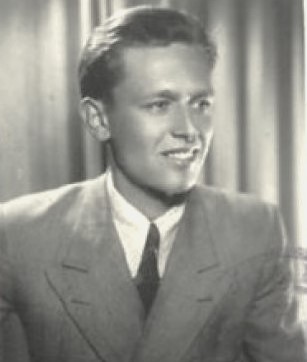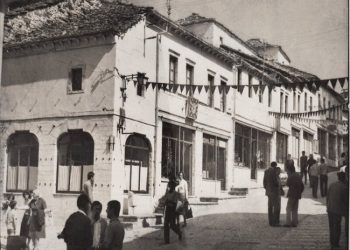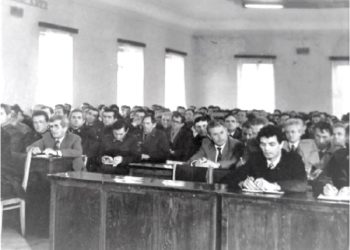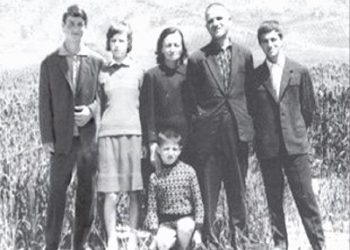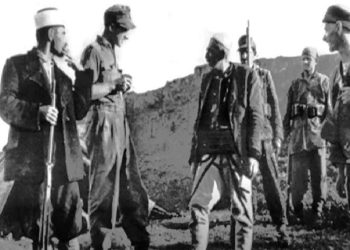By Alfred Papuchiu
Memorie.al / The years have passed, as if without understanding. But we still remember Tuni Papuchiu, always smiling, measured in words and actions, correct and generous, noble. We bring to our imagination, a man so beloved, not only for his relatives, but also for his colleagues, for the little ones, for everyone. And, for sure, they will feel this through his writings, inspired even by children and parents, who did not know him closely, alive. The father liked nature, flowers and especially magnolias, red roses; he often stopped to look at the horizon and smiled. He was true to himself, clear in his thoughts and logic. He was an observer of Albanian society, he liked clean society, he avoided careerists and achievers, and he never cursed. He was the epitome of goodness.
Tuni had a passion for genealogy and I often return to that block where he marked the genealogical tree of our large family, since the 1700s, from Voskopoja settled in Fier, like many families from martyred Kosovo. The Papuchians are among the first to settle in Fier. Then, according to the testimonies of the elders of the time, Loni Xoxa and Grigor Dhima, other families came, such as; Demajt, Xoxajt, Plakajt, Pogacajt, Ticojt, Dhimajt, Lakot, Verriajt, etc. Fieri was gradually growing and after the construction of the Gjanica Bridge and the church of Saint George, in 1864, Fieri became a city.
On March 23, 1922, the unforgettable Tuni Papuchiu was born. He left us, suddenly, one day at the beginning of June 1975, before turning 53 years old. Away from us. In Shkodër, among friends and well-wishers, who loved him and who loved him? Even in the last moments of his life, he did not want to disturb anyone, not even his roommate. He is gone, although his loved ones would like to have him much more near them, to hear his melodious voice, which gave life to dinners between friends, weddings of relatives, the joy of the approach of a New Year, among neighbors. “Tuni Papuchiu belongs to the elite of publicists. Where Tuni was, there was song, joy and humor. Where Tuni was, there you met honesty, readiness, trust and optimism for life”.
He never asked for something for himself even though it belonged to him more. He worked modestly all his life, in the press bodies of the time, before turning 20 years old. Above all, he was honest and proud and remained so until the end of his short life. Everything motivated him and he did it for the good of his homeland, of the common people. His relatives and friends will remember him as a frank man, with character, who used his voice to do things for himself when there was joy in his family or company, but who also expressed his deep regret for the misfortune of a friend or acquaintances, who were by their side, in flesh and spirit, to go through the pain together.
How many times, fellow citizens and villagers of his province came to Tirana, to help simple Tuni, for a problem, to meet a good doctor, to show proper care, to help the children to be educated, knowing his big heart, his painful soul, his breadth. And he helped them as much as he could, as if they were the people of his family. Without asking in exchange any favor or privilege, for himself or his family. The only thing I remember, when my father died, many, many people who I didn’t know came to console me, but who, in simple words, expressed their gratitude for him.
Tuni was the only brother among five sisters. I was the second of the children, after my sister Kristina. His father, Peçi, as a lover of education, recognizing his son’s intelligence, took him to Tirana for studies at the age of ten, since Fieri, his hometown, had only an elementary school in those years. Tuni almost grew up in Tirana. He completed his studies at the expense of his father, who often went to see him to follow his progress. With the generosity that characterized him, he also helped his son’s roommates.
As Tuni’s sister, Pandora, said: “Great joy erupted in the family, when Tuni came back to us on vacation. He would always bring books with him, the few original works and translations that were published at the time. So in our house, a rich library was created for the time, which gave us the opportunity to read. First, in the long winter nights, we would gather around the hearth and for the younger ones, the second sister, the third of the Xanthipi children, would read to us…”!
Although Tuni grew up with all the good things from his parents, he never wasted their care, on the contrary, until the end of his life, he was very devoted to his family, to his parents, to his sisters, and this behavior made him very dear not only to his relatives, but also to his friends and comrades. He exploded in his indescribable joy, together with the unforgettable Anton Mazreku, for the great victory in the 1946 Balkaniad, which he also expressed in his “Sport” writings of that period. He was the first editor-in-chief of the Albanian “Sport” after the liberation. Very expressive and unforgettable, is the photo when the football team became the champion of the Balkans and everyone, my father, Andoni, Loro Boriçi and the team, were very enthusiastic about that well-deserved victory.
Tuni himself was formed as a journalist during the War, when he published the newspaper “Pirpjekja e Rinia”, in Sevaster, Vlora, together with the unforgettable Jakov Xoxa. It was one of the most famous families in Fier and is mentioned with love and warmth by the writer from Fier, Jakov Xoxa, in the several-volume novel “Dead River”. “The Effort of Youth”, copies of which I carefully store in my archive, became the fruit of joint work with the writer Jakov Xoxa, whom I also met many times when he stayed in Apolloni, but also in the last days of his life, when he was cured in ward 12 of the Tirana Hospital, and we talked about literature and our beloved Fier and with good and simple people, hosts of the Girokastrites, but also of the other three from Albania and Kosovo.
Then he worked for 12 years at night in the newspaper, rather as a “freshman”, where he lost one of his eyes, but with a cheerful character and his friends, who are still alive, remember with nostalgia those magnificent evenings of the 50s, where Tuni sang songs of his country. Since 1959, until he passed away, he directed the biweekly illustrated literary and artistic magazine “Fatosi”. He died suddenly in Shkodër, on June 3, 1975. A Street in Fier, his hometown, is named after him. He has been decorated several times for his literary and publishing activity.
At the Institute of Folklore, he handed over a large notebook with all the musketeer songs, which he himself sang so beautifully. The 100-year-old singer, Timo Lule from Como, Italy, remembers the musky songs he sang with Tuni, many years ago, and which remain in the memory of Fierak people. Until he died, he organized literary readings, going to the readers, collaborated with magazines and newspapers of the time produced his own and his friends’ publications surrounded him with authors who were famous, or who soon became famous. A writer, but above all, a man and a citizen, such that his portrait remains poignant, a reflection of the era in which he lived.
I remember that my father had a regular correspondence with his uncle, Vangjel Lulen, although there was an age difference of 25 years with him. He was a democratic fanatic, a man with broad horizons, he knew several foreign languages. Uncle loved Tuni and Tuni uncle very much, as well as uncle Komi, so they consulted each other about everything, as if they were friends of the same age. Sister Pandora, in her memoirs, tells, among other things: “Tuni’s pain was great when, at the age of 45, one of the sisters, Xanthipi, died, leaving her 8-year-old daughter orphaned.
He took special care of her. He slept with her at night, took care of her schoolwork, food, and children’s entertainment. He felt very deeply the responsibility for the orphan girl’s fate. As he told us later, the unforgettable Lajde Staku, who stayed by his head until the end, until the last night, he pronounced: “Life… Life”. Life, as if it was his last bequest and me and Bedriu, we kept this bequest sacred, until Jeta, today an engineer and mother of two children, we brought him to life…”!
Once he helped a typographer, retouching with him thousands of copies of the magazine, the mistake that the latter had inadvertently passed, so that he would not pay a large sum as compensation. He helped young painters in the 70s, in their beginnings such as Agimin, Edin, Vlashin, etc., and writers, to walk the path of art. The pages of “Fatosi” were filled with drawings and illustrations of young painters, who probably took their first steps in “Fatosi”, which was published in its beginnings, by the only responsible editor, Tuni, with editor-in-chief prof. Bedri Dedja. The magazine had a wide network of collaborators, students and well-known writers that Tuni brought closer to him. How often did he go to Safo Marko to create a beautiful illustration to entice the children?
There he stood and talked with the great Petro Marko, who had a pure soul, but who remained “a proud rebel”, who did not accept meanness and close people. Petro Marko’s house near the maternity hospital was filled with the beautiful paintings of the famous painter, his wife Safos, who together with the meritorious painter, Agim Faja, had the priority in the magazine “Fatosi”. Tuni loved young people and worked passionately to edit their writings, so that they could see the light of publication. Often, even if an article was not hit, he would tactfully talk to the author, or write him a kind letter, so as not to kill him spiritually.
Correspondence with his permanent friends, painters and writers, with; Agim Fajën, Lajde Stakun, Skënder Drinin, Xhevat Beqaraj and many, many others remain an example of his love for art and literature, be they writers of any age. He offered around her well-known pens, which gave a boost to children’s literature, such as: Dritëro Agollin, Petro Markon, Kolë Jakovën, Bedri Dedjen, Odhise Grillon, Nasho Jorgaqin, Xhevat Beqaraj, Helena Kadarenë, Lajde Stakun, Shpresa Vreton, Skënder Drinin. , Prof. Aleko Minga, Prof. Petrit Skende, Prof. Mina Naqe, etc. He had a lively temperament.Professor Alfred Uçi has described Tuni as an “irreplaceable man”. He was an idealist and believed that one day the right, kindness, solidarity would win, the poor would disappear and the beautiful characteristics of the Albanians would be restored over the centuries.
Not for nothing, his former magazine colleague, Llambi Blido, described him in a memorial writing for him; “man-editor”. He did not spoil his friend’s veil, or his friend, or the one who was meskin, but if he was open with real friends and companions, he did not get close to the one who was meskin. His friend who always visited Tirana, the distinguished painter Agim Faja, wrote to me in a letter dated June 23, 1975: “It’s been almost 20 days since Tuni is no more. Months will pass, years will pass, decades will pass, and Tuni will never be with us again. I, Fred, did not see Tun dead. I was notified late, so I arrived exactly at the time when he was leaving the house, when his qivuri was coming out, red, like his pure blood, like his purified soul, like his sincere thoughts.”
“Everyone comes into the world and everyone leaves one day. But not everyone leaves a name written in the memory of society. Name written with pure sweat and beautiful writing of their character. The name of Tuni Papuçiu has remained in my memory like the sounds of a song that was sung years ago, but that continues to echo as you read a children’s book, or browse a newspaper, or…a handwritten note of his son, Alfred. There is nothing more beautiful when the parent’s charm is repeated in his child. Continuity is the daughter of immortality, not only genealogical, but also spiritual and moral”. (Vangjush Ziko).
“I always remember him with great respect, I remember him laughing and with humor talking with my father, Sterjon, in our house. May you live and always remember this artist of Albanian journalism. Ilindeni”. While in the letter he sent to Professor Bedri Dedja and his wife Pandora Dedja, the writer Aristotel Mici, among other things, wrote: “I liked the article you had written with Xhevat, about the poems of the honorable Tuni. I read it with interest. It seemed to me like an enthusiastic farewell. The comments seemed sincere to me, as are the poems themselves. I call the article a fulfillment of my desire for Tuni’s poems, who passionately wrote civic and festive lyrics for children. My 6-year-old Valbona boasts of Tuni’s beautiful rhymes. I wrote her pride for the book in a small letter to the author. Uncle Tun’s book in the library of our house is placed differently from the others. He stands behind the glass, like a photograph, like a mirror of a simple and honest soul…”!
The late writer from Shkodra, Lajdja Staku, for whom my father had special respect, as well as for the writer Skënder Drini, and many others from Shkodra, wrote to us a few months after my death, among other things, these lines: “We always have here the name of Tun, among other names of friends, whom we always remember on these days of holidays. Now in this year we are feeling something difficult, we are feeling the emptiness of a friendship…”!
Friends and well-wishers always remember Tun from “Fatos”, with respect and gratitude, as a man who left only good memories for everyone, as a man of work and understanding.”
“We are now browsing the book of the publicist and writer for children, Tuni Papuçiu, “A special drawer”, says Professor Murat Gecaj. “His unforgettable portrait is clear before us. With the long and lean body, like an athlete, with the sweet smile, with the keen eye and, deep down, with such a wonderful soul. It could not be otherwise, he, who connected his whole life so closely with the education and well-being of our young generation. Looking at the book as a whole, ‘…A special drawer’, is like a short “biography” of the magazine so popular at the time, ‘Fatosi’, where he poured his sweat and melted his outstanding talent, for a long period”.
Tun’s writings stand out for their simple and rich language, for the pedagogic and didactic thoughts they contain. He kindly counseled and taught the children, like a parent and an older educator, how to create, how to learn and how to behave in life, to become as useful as possible to themselves, to the family and to the whole world society. How many times have we sat down to work on the magazine covers, almost regularly for each issue, and always the lovers of the printing press, when they saw that the model was ready, happily made room for its priority release.
In the History of the Anti-Fascist National Liberation War of the Fier district, drawn up in 1975, it is written, among other things, on page 148: “In the fire of this war against the enemy, the young people of Fier, such as Abaz Kondi, Tuni Papuchiu, Ndreu Dema, Milika Budo , etc., work by collecting information and materials for the National Liberation Movement, distributing tracts, and participating in combat actions, against the enemy”! Tuni’s family and the whole tribe were connected to the Anti-Fascist National Liberation War. Two from the door of the Papuchis, Miço and Loni Papuchiu, were martyred. One of his sisters, Olimbia, was also in the partisan ranks.
I remember my father’s conversations with the academician Mahir Domi, about the pure Albanian language, which he wanted to use in “Fatosi”. Prof. Mahiri was our closest neighbor. Often prof. The great Mahiri used to take the bottles of “Fatos” and correct them carefully. The first copies of “Fatos”, as soon as they came out of the printing press, were given to him for Etleva and Ben, his children who came and stayed with us every dinner, to leave him a little quiet to work on his linguistics books, the professor the famous Mahir Domi, of few words, who lived in a house, only two rooms and a kitchen.
“Poem for Vedihana”, the friend of Prof. Mahirit, is a hymn that my father wrote, about that host woman from Delvina, who took such good care of her children and her professor husband, who never took her eyes off her books. Keep as a memory the last book that sister Pandora collected in his memory with the title; “A special drawer”, with such a beautiful cover by his best friend, Agim Fajë. Someone thought after his death to publish a book with his stories, as a memory and gratitude for him. At the printing press, the first copies of “Between the willows, by the river” came out with his big picture (prepared by his typographer friends) and we all felt like we had him close to us and we missed him.
Later, a volume of stories, fairy tales, poems and skits, collected by the writer Xhevat Beqaraj, was published. On this occasion, he was given a special award after his death, for his rich literary activity, for the little ones he loved so much and for writing the most successful texts for the Children’s Festivals organized in Shkodër. With the care of prof. Bedri Dedje and my sister Eti, a memorial evening was organized for the unforgettable Tun. From time to time, when I am alone and tired of daily work, I put on the video tape and listen to the words so loving and touching of the participants in that memorial evening: prof. Alfred Uçit, the writer Xhevat Beqaraj, the writer Nasho Jorgaqi, the writer Shpresa Vreto, and many others…!
The book “A Special Drawer”, which was published after his death, is a beautiful reminder of his father’s rich creativity. For years, in the nationwide Children’s Song Festivals, organized in Shkodër, he has won the first prizes for the lyrics of the songs, composed by authors such as; Česk Zadeja, Tonin Harapi, Avni Mula, Tish Daija, Pjetër Gaci, etc. His literary activity is also included in the encyclopedic dictionary “Albanian journalists and publicists”, compiled by Prof. Dr. Hamit Boriçi and published by the “Union of Professional Journalists of the North (UGPV), “Prominent Figures of the Fier District”, as well as in “Lexikon”, with the title; “Albanian Writers for Children” (1872-1995) compiled by prof. Odhise K. Grillo./Memorie.al




